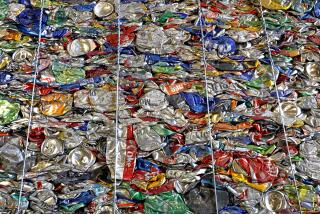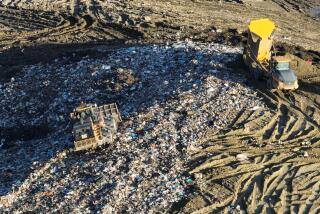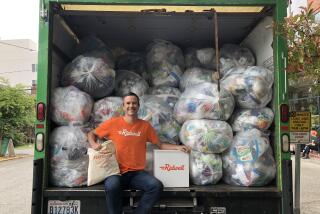SEAL BEACH : Hands-Off Recycling Program Considered
Residents may not have to change their waste-disposing ways if the city selects a hands-off recycling program.
City officials are considering a program that would allow residents to continue to dispose of waste in one container and have it picked up curbside. Sorting and recycling of the waste would be done at a selected recycling center.
Council members are still raking through the pros and cons of such a system and have yet to put the question to residents in public hearings. The city is also considering a curbside program in which residents would do their own sorting. A decision is expected by June.
Seal Beach is among the few Orange County cities that has yet to adopt a recycling program. Municipalities statewide must cut their disposable waste 25% by 1995 and 50% by the year 2000 or face stiff fines.
Mayor Frank Laszlo said the city is leaning toward using what is called a material recovery facility, or MRF, at which recyclables would be sorted from residents’ trash. “Collecting as we do today and recycling at centers will be cheaper and result in a higher rate of recycling,” he said.
Seal Beach generates about 46,016 tons of garbage annually. Of that amount, residential waste accounts for about 33.7%, or 15,500 tons; commercial waste about 22.4%, or 10,315 tons; and industrial waste about 43.9%, or 20,201 tons annually, according to the Orange County Solid Waste Management Department.
Not all officials and residents are sold on the proposed hands-off recycling program. Council member Evelyn Forsythe argued that use of an MRF will provide residents no incentive to cut back on the waste they produce.
“Just letting them throw everything in the garbage can, I don’t think that is teaching anything. The goal is to reduce the mainstream waste. We need to get the word out to consumers that our landfills are a finite resource,” she said.
Officials said trash rates would probably go up to offset the cost of using an MRF. Forsythe said she is concerned with that prospect because the city would be paying for a service while the recycling company also made money off the recyclables in the city’s trash. If the city adopts the MRF system, she said, the cost to the city should be offset by the money its recyclables brings in.
Another drawback of the hands-off system is that some of the recyclable material will be lost in the shuffle, said Mario Voce, chairman of the city’s Environmental Quality Control Board. For instance, he said newspapers soaked with motor oil from a leaky can would have to go to the landfill, as would broken glass that is missed during the manual sorting process.
Voce said that in order for the MRF program to be successful, people will have to change their disposal habits. “With a situation like this, there is still going to have to be some level of education,” he said.
More to Read
Sign up for Essential California
The most important California stories and recommendations in your inbox every morning.
You may occasionally receive promotional content from the Los Angeles Times.










